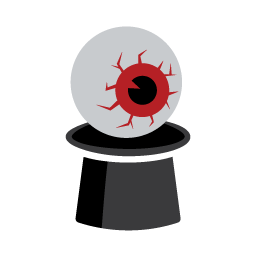I mean, there might be a secret AI technology that is so advanced to the point that it can mimic a real human, make posts and comments that looks like its written by a human and even intentionally doing speling mistakes to simulate human errors. How do we know that such AI hasn’t already infiltrated the internet and everything that you see is posted by this AI? If such AI actually exists, it’s probably so advanced that it almost never fails barring rare situations where there is an unexpected errrrrrrrrrorrrrrrrrrrr…
[Error: The program “Human_Simulation_AI” is unresponsive]
How do you know everyone IRL isn’t an NPC because this is just a simulation?
Take the blue pill and find out!
The last time I took the blue pill I didn’t care if it was a bot or not, I wanted to fuck it.
Because such a massive simulation without players serves no purpose that’d justify the waste of the resources needed to run it.
Maybe it’s someone’s sick fun… or an experiment.
I saw a movie or, probably, an anime with this theme in the last year. People discover they are a simulation, manage to breach through to this race that is just lost in viewing virtual space. Wreck shit, go back.
I prefer The Thirteenth Floor. 1999 scifi noir.
spoiler
A person from 1937 finding out their world is a vr simulation in running on a 1999 computer. Then the 1999 people finding out their world is a vr simulator too, running on a 2024 computer.
Expelled from Paradise?
That wasn’t it. Damn it. I’m trying not to get pulled into figuring this out, but my brain is of the opinion that there’s no better use if my sleep time lol. I’ll see if it comes back to mind
In a way, this is also how Sausage Party ends.
If someone is both capable and willing to spend such massive amount of effort for such an experiment, he already has all the answers the experiment might provide. It’s like thinking NASA would create massive telescope and place it on an orbit, just to point it at Earth and record how cats hunt.
Same with fun. Whoever possesses enough resources to waste them on “fun” alone, already has the access to way more interesting pleasures. It’s like thinking Jeff Bezos is going to buy a private island and buy a luxury bunker there, for the purpose of torturing cockroaches.
I never said any of this might not be true, I just said what if. The experiment idea seems more plausable to me. And why not make an experiment, as you said, if they’re that advanced, making this experiment would be a piece of cake to them, like us making experiments with ants or bees.
I simply observed that logic dictates such an experiment obsolete.
Whoever has all the technology, resources and skills to conduct such a massive test, already has all the answers the experiment might provide. Beings capable of conducting such a test definitely have better questions to answer.
It could still theoretically be that our reality is some kind of entertainment. For example, people enjoy playing The Sims. There are still active communities for the older versions even though there are newer, more engaging games out there. And more generally, some people prefer old games even though their computers have like 1000x the processing power needed to run it.
If the reality we experience is a simulation, it could be for similar motivations, the hardware would be sophisticated but still a user will run whatever they prefer on it.
We enjoy watching SIMS and playing video games, because our reality is too bleak and dark. It’s a form of escapism, mostly.
Civilization that could create and sustain such a massive and complicated simulation as our reality, already knows ways to make the life interesting enough that it makes any form of SIMS-like entertainment obsolete.
Maybe they’re just mice trying to find the question to life the universe and everything.
I know where my towel is, but again: the effort it takes to create and maintain such a simulation belongs to order so high, it no longer cares about such trivialities.
I’ve “played” plenty of simulations that are just things that run entirely on their own without a player input aside from the starting parameters. Chiefly being the one aptly named “The Game of Life.”
These are highly primitive and limited simulations, that follow basic patterns and can’t evolve much.
Ours is a reality complicated, vast and chaotic. They can’t be compared.
I wasn’t comparing them… I was pointing out how simulations don’t need “players.” 🙄
You said you “played” simulations. I pointed out that what you were playing can’t be compared to the complexity of our reality and therefore does not constitute a plausible argument.
Just for the sake of clarity: I’m not attacking you, it’s just that what we can simulate and observe can’t be used as an argument in discussion concerning our reality. It’s apples & oranges. We operate on entirely different level of complexity to whatever we may simulate.
If it’s a simulation your imagination and understanding of the world (simulation) is limited and you have no idea how resource intensive it would be to run, perhaps we’re a kids toy for some being
Again: the resources, the effort needed to create and sustain such a massive simulation just for fun, belong to civilization of so high advancement, that it renders the idea impossible.
Beings being able to do it would be able to bypass any stage of infancy or childhood, because it’d be obsolete and pointless for them.
how do you know the motives of something like that enough to know what’s pointless?
Because that’s how evolution works in intelligent species, or at least should - it leaves behind everything that’s no longer needed.
We, human beings, can simulate worlds more complicated than the real one. It doesn’t have to be like The Matrix. It could be like Dwarf Fortress. We wouldn’t know if we are the simulation because it would always seem real and complex to us, even if all the creatures running the simulation see are numbers/text.
We, human beings, can simulate worlds more complicated than the real one.
No, we can’t.
We can’t even simulate less complicated worlds, but so alien that they follow entirely different “natural laws” to our own.
Dwarf Fortress
Dwarf Fortress is ridiculously primitive in comparison to our reality.
…?
If it’s a simulation all the laws of physics and so on that you’re basing these theories on might not even exist outside the simulation.
You can’t simulate a massive environment so alien to your own that they have nothing in common. You could answer “of course I can”, but all your arguments for that would be Russel’s Teapot.
At some point it all stops mattering. You treat bots like humans and humans like bots. It’s all about logic and good/bad faith.
I’ve had an embarrassing attempt to identify a bot and learned a fair bit.
There is significant overlap between the smartest bots, and the dumbest humans.A human can:
- Get angry that they are being tested
- Fail an AI-test
- Intentionally fail an AI-test
- Pass a test that an AI can also pass, while the tester expects an AI to fail.
It’s too unethical to test, so I feel that the best course of action is to rely on good/bad faith tests, and logic of the argument.
Turing tests are very obsolete. The real question to ask, Do you really believe that the average persons sapience is really that noteworthy?
A well made LLM can exceed a dumb person pretty easily. It can also be more enjoyable to talk with or more loving and supportive.
Of course there are things that current LLMs can’t do well that we could design tests around. Also long conversations have a higher chance to show a failure of the AI. Secret AIs and future AIs might be harder of course.
I believe dead internet theories spirit. Strap in meat-peoples, rides gonna get bumpy.
You treat bots like humans and humans like bots. It’s all about logic and good/bad faith.
Part of the thing with chatgpt is it’s particularly good at sounding like it knows what is saying, while spewing linguistically-coherent nonsense.
For many (most? Even all to some degree?) of us, we have some idea ingrained in our culture of saying what we think to be true, and refraining from what we don’t. That’s heavily diluted on the internet, but the converse tends to be saying what we think will make people support/agree with us. We’ve grown up (some of us have!) with some feel of how to tell the difference.
GPT (and I guess most human-like chat bots will be similar for now) is more an amoral, or a-scient, attempt to say something coherent based on the training data. It’s different again, but sounds uncannily like what we’re used to from good-faith truth-speakers. I also think it’s like the extreme-end of some cultures that prioritise saying what will make the other person happy, more than what is true.
The real question to ask, Do you really believe that the average persons sapience is really that noteworthy?
Part of the thing with chatgpt is it’s particularly good at sounding like it knows what is saying, while spewing linguistically-coherent nonsense.
That’s why this is so scary! The average person on the internet is being fake the same way chatGPT based bots would be! haha… :(
Your whole comment is great, you understand the passable, seemingly coherent nature of it. It’s only a hair less coherent than the average person that would argue in bad faith, and if optimised with that specific data would be… scary
Here is something I mentioned before on a different topic to show you the flaws of people, more so than the capabilities of bots. https://lemmy.ml/comment/1318058
The thing that bothers me most is this thought exercise. If govt agencies and militaries are years ahead, and propaganda is so useful, shouldn’t there be an ultra high chance that secret AI chatbots are already practically perfected and mass usable by now?
We have seen such a shift towards a dead internet that these are our final chances. I think we should spend more effort on finding tricks to ID bots and do something about it, else take to the streets.
((Why does Firefox crash on me!!!))
((Maybe even Firefox knows I typed too long and rambly.))
So, where does that leave us? There’s always been unreliable knowledge from people. Joe in the next village tells tall tales about Martha from Sweden who catches fish with peeled strawberries. Scientific standardisation has helped a lot, and allowed for a sort of globalised reliable knowledge, but its cracks are showing. We trust ‘the experts’, but then find Wikipedia has trolls and WHO is influenced by Chinese diplomacy. So we trust ‘the community’ and find Amazon reviews are bought. So we trust our moderated sublemmits, and find out the content-to-user matching algorithms breed echo chambers. So we trust the government to moderate, but the American Left admit the Democrats are bad, and the Right admit the Republicans are liars. (And I’ve never even been to America!) So at last we go back to Aunt Jenny, who’s deeply afraid that black people will take over the country, and the local sysadmin whose network security is based on the book he read in the '90s.
Maybe we need to relearn tricks from the old irl days, even if that loses us some of what we could gain from globalised knowledge and friendship. Perhaps we can find new ways to apply these to our internet communities. I don’t think I’m saying anything new here, but I guess fostering a culture of thinking about truth and trust is good: maybe I’m helping that.
Almost as an aside (so I don’t ramble twice as long like my crashed-firefox answer!): The best philosophical one-liner I’ve found for first-principleing trust, is, does this person show love? (Kindness, compassion, selflessness.) To me, and/or to others. Then that imparts some assumed value to their worldview and life understanding. Doesn’t make them an expert on any topic, but makes a foundation.
And finally,
Do you really believe that the average persons sapience is really that noteworthy?
Yes. If you mean, is their comment more noteable than most others, in a public debate, then no. But if you’re pointing towards, are their experience, understanding and internal processes valuable, then yes, and that’s important to me. (Though I’m not great enough to hear, consider or interact with everyone!)
The average person on the internet is being fake the same way chatGPT based bots would be!
Do you reckon so? I think fake internet usually talks different to chatGPT, though of course propaganda (national or individual level) tries to mimic which or whatever will be most effective. My point was largely that chatGPT mimics the experts we’ve previously learnt to trust, better than most of fake internet was able to do before, whilst being less sapient (than fake internet) and at the same time being yet more and yet much less trustworthy.
So, where does that leave us? There’s always been unreliable knowledge from people.
I think we need to recognise our knowledge is sketchy, stolen, faked and from there, start to rebuild in our own way. It’s ok to accept that we don’t really know if we landed on the moon, or if E=mc2. I feel both of those are true btw, just sayin’.
I’ve found myself feeling better when I let go and swap to a “I feel that…” or “seems that…” style. My certainty is now mostly for things I’ve intellectually bled for, like my epistemological understanding that truth comes from the best attempt of reducing conflicting knowledge.
I’ve investigated conspiracies and scams, magic tricks, con artists, “truths” and statesmanship. In the end I realised that I ultimately faked that I knew, until i put in hard work to investigate, and after confirming some scary things, I stopped lying to myself and assuming I knew most. I might talk big sometimes, but I’ve got some heavy doubt that id mention if it was easier to type out.
Here’s a starting point to consider. Have you actually checked the words you type in the dictionary or an etymological dictionary? I found out i was massively assuming and guessing, and that I was totally wrong. It got to the point where I was checking definitions each day and feeling stupid and enlightened each step.
Now compare that to an LLM that feigns confidence and sounds coherent. Once I could see through peoples deceptions that they just pretended to know, I realise too that an LLM is really functionally the same.
Maybe we need to relearn tricks from the old irl days, even if that loses us some of what we could gain from globalised knowledge and friendship. Perhaps we can find new ways to apply these to our internet communities. I don’t think I’m saying anything new here, but I guess fostering a culture of thinking about truth and trust is good: maybe I’m helping that.
Yep! The geniuses that design my processor know the answer, not me. I can let go and claim a vague probably wrong idea of how it really works but I no longer need to pretend to know what I don’t. Our silly chains of trust are damning humanity. We assume that the products we use don’t have massive negative repercussions and now look at it all. We are destroying forests, poisoning rivers, pollution our bodies with PFOAs and microplastics, we are depressed and fat, lonely and anxious. We assume this is good because it’s progress. We FEEL that this isn’t great, but trust the experts.
Almost as an aside (so I don’t ramble twice as long like my crashed-firefox answer!): The best philosophical one-liner I’ve found for first-principleing trust, is, does this person show love? (Kindness, compassion, selflessness.) To me, and/or to others. Then that imparts some assumed value to their worldview and life understanding. Doesn’t make them an expert on any topic, but makes a foundation.
:D I once wrote the first voluntary essay of my adult life entitled “us vs them” and it boiled down to “If we don’t know which side is right, the easiest way to tell who is wrong, is to look at who is using dirty tricks and dishonesty”. What you wrote was the other half :) I would consider this the good/bad faith explanation. You described good faith, I described bad faith. Our instinct is to rely on good people and avoid bad people. It’s not perfect but our instinct helps us a lot with it.
Yes. If you mean, is their comment more noteable than most others, in a public debate, then no. But if you’re pointing towards, are their experience, understanding and internal processes valuable, then yes, and that’s important to me. (Though I’m not great enough to hear, consider or interact with everyone!)
I was talking about the average persons sapience in an absolute or relative way to other people. I didn’t think you would see it against AI stuff. Most people aren’t using their sapience like you seem to be, to question and wonder, to learn and process information. Most people are very fixed and will do as you said before, they will do what makes them sound right, or win favour. They are faking their skill. It takes a ton of effort to really do new things, and most people just don’t bother very much.
As for the GPT thing. It should be pretty bad and easy to spot right now, I’m still just worried about the secretly optimised ones and totally secret techs that are similar. In a real convo you can detect a persons sapience, but not the people talking in bad faith.
ChatGPT is optimised with high grade texts but a diff one could be trained in final stages to mimic incoherent bad faith arguments. The higher level arguments should give away chatGPT currently as it’d be heavily scrutinised.
Thanks for the reply btw, I know how annoying it is to lose a huge response lol. Don’t upvote while proof reading!!!
Ah, the dead internet “theory”? Ultimately, it doesn’t matter.
Let’s pretend that you’re the last human on the internet, and everyone else (including me) is a bot. This means that at least some bots pass the Turing test with flying colours; they’re undistinguishable from human beings and do the exact same sort of smart and dumb shit that humans do. Is there any real difference between “this is a human being, I’ll treat them as such” vs. “this is a bot, but it behaves like a human being and I need to treat it as a human being”?
Turing test isn’t any good to discern a human from a bot, since many real people wouldn’t pass it.
We can simply treat those “real people” as bots, problem solved. :-)
But serious now: the point is that, if it quacks like a duck, walks like a duck, then you treat it like a duck. Or in this case like a human.
I made an observation that Turing test is too flawed a tool to be any reliable. If you want to find out who is who, you need something better, more like Voight-Kampff…
Sure. The test itself doesn’t matter that much, contextually speaking; just that you have some way to distinguish between humans and bots, and yet the internet would be filled with bots that pass as humans.
I guess that the RL equivalent of the Voight-Kampff would be trolling? We have no access to respiration or heart rate across the internet (and if we had, it could be counterfeit), but humans would react differently to being trolled than bots would. Unless the bots are so advanced that they react to trolling the same as we do, and show angry words in response.
I guess that the RL equivalent of the Voight-Kampff would be trolling? (…)
Interesting. I didn’t think about it, but pushing correct buttons and observation of the reactions might indeed be good foundation for some “humanity” test.
You may be onto something, man. Good job! 👏
Well it would definitely matter at least for practical purposes, like if you wanted to meet up with somebody.
This is a good answer, because it prevents the dehumanization trap that these theories fall into:
Basically, the belief that some beings don’t have “souls”, and don’t have to be treated with conscience.
The “we are in a simulation” conspiracy fans toy with an idea of NPC that is horrifying: That some humans are just acting like humans very convincingly, but they are just thin shells that don’t really really feel pain or happiness. Whatever you do to them can’t be morally wrong.
It is also similar to how some religions have ideas that people can have their soul taken by Satan and are just demonic possession vessels here to corrupt us. They behave very much like humans but do not be tricked!
Europeans used to think Africans had no souls, they were just animals that were very good at imitating human behavior.
These thoughts are all extremely strong tools for any fascist movement needing some vague excuse to commit atrocities to their opponents and scapegoats.
I’m not a bot, I… was just here to promote a movie.
deleted by creator
Oh bugger.
Welcome to solipsism. We’re happy to have you.
Okay you clearly don’t exist, I just need to delete you from my brain.
/s
You can trust me, fellow human
Looks like the bot @001100010010 is becoming self aware.
Shut it down. Lets try again
It’s been a while since I’ve had an existential crisis. Thanks!
My existential crisis has been ongoing since the day I first had an existential crisis. I suspect that my parents are just part of the simulation given how they always yell at me when ever I have a happy moment. I can’t ever just enjoy some time in peace.
If you’ve not made an AI bot version of yourself to post stuff online, what are you even doing with your life?
Agreed. There’s even free software to do it. There’s no excuse not to, now.
This comment brought to you by FreeBots4U. Buy our new soda.
Ah, you’re on the free plan.
Bots have limitations. They avoid certain specific topics, or answer in very vague way.
Also, some of us met in real-space, soooo…
do we? or do we only REMEMBER doing it? ;)…
Ha! That’s what the government wants you to think. What actually happened was
Yeah, I can speak out on this just fine,
We do. Because there are many physical proofs of our meetings.
are there? i sit here in front of my computer, no person anywhere. also not a single sign of a person being here except me. for all we know we could be a boltzmann brain imaging our past life and we will be gone in a few se
Yes, they are there. For example: I’m just about to go for a walk and I will see the same markings I made with my friend some 12 years ago, in the same spot.
what tells you that you are currently not in a dream and the whole reality is just created that way? and before you read this text right now, there existed nothing because you just got created with fake memory’s right now (boltzman brain)? :p
(sorry, i know this goes too far now and i should stop. so i will now :D)
It’s ok, questions imply the revision of personal viewpoint, so they are very welcomed.
Anyway: each and everyone of us interacts with the world around us, changes it, even if these are small changes. These changes can be observed, confirmed by many other inhabitants of this world, and they often evolve when we no longer pay attention to them, or forget about them. We often learn about things we did in the past, that became something else, were important for someone else, and so on and so forth.
The typical example might be that we left some apple somewhere, visited the place years later only to find a small apple tree growing there.
This suggests that the reality around us is persistent and it works even when we don’t observe it, according to laws and rules we might be oblivious to. As such, it can’t be a mere dream.
Let’s say that all those memories are implanted. Ok, but since these memories are implanted into many different inhabitants of this reality, and not just “these memories”, but their variations, including the evolutions I’ve been talking about, it’d mean, that there’s some big, huge enterprise tasked with keeping “the storyline” intact.
Imagine the energy needed to do just that, the amount of operators and administrators that’d have to pay attention to every scratch you make on a wall, every stone you move, every tree you plant, consciously or not…
Text bots have been able to pass a Turing test and be indisguinshable from a human for a long time. They had chat bots that could trick you into thinking they were real people, that college kids made just for fun on IRC and even in games back in the 90’s.
These rules that ChatGPT imposes so it doesn’t create something someone may find harmful are relatively new. And there’s no law saying they need to be there.
Turing test isn’t and never was a good way to discern a human from a bot, since many real people wouldn’t pass it. It has been criticized from day 1 and today it’s nothing more than peculiarity.
Check this thread for “Turing” - we already discussed it and some people provided very interesting alternatives to it.
That quickly boils down to “How do we know anything?” and the answer to that is “We don’t”. When you think hard enough about anything you can come up with an explanation why what we think to onow and believe is wrong. To get around that irl you can employ different tactics. For example, you can check how plausible sonething is. How many assumptions do you have to make for a theory? Usually, more assumptions means less plausible. And you can ask yourself " why does it matter? What would it change for me?" and the answer is most likely it doesn’t and nothing.
Well, we do know 1 thing without making at least one leap of faith, courtesy of Descartes:
If nothing existed, there wouldn’t be anything to have these thoughts. Therefore, since I’m thinking, there must be something that exists, and at least part of that is me. It might be an algorithm, a boltzman brain, some weird universe of thought, whatever. I might even be this singular thought and what I assume to be my memories and nothing else exists. But I know I exist in some kind of way.Beyond that, you need to make assumptions, like whether reality is logical, whether your senses and and memories have any relation to reality, and so on and so forth. It makes sense to assume these assumptions are correct, but you can’t know or prove they are true without relying on other assumptions that you can’t know or prove independently either. Heck, without assuming that reality is logical, the concept of a proof doesn’t even exist. You can choose to reject those assumptions, but that’s a useless philosophical deadend.
Which is why someone answering “Believing is what you do in church, we’re in the business of knowing!” to a sentence like “I believe I’ve seen this before” annoys me a bit, since you can’t know anything useful without believing a bunch of stuff first. If someone’s going to be pedantic about that choice of words, so can I.
deleted by creator
I’m not a bot. You’re a bot!
That sounds like something a bot would say…
Every account on Lemmy is a bot except you.
deleted by creator
we don’t. also check this out - https://en.wikipedia.org/wiki/Solipsism
It can be hard to tell if you’re talking to a bot online. Some bots are really good at mimicking human conversation, and they can even make spelling mistakes to seem more realistic. But there are some things you can look for to help you tell the difference between a bot and a human.
For example, bots often have very fast response times, even if you ask them a complicated question. They may also repeat themselves or give you the same answer to different questions. And their language may sound unnatural, or they may not be able to understand your jokes or sarcasm.
Of course, there’s no foolproof way to tell if you’re talking to a bot. But if you’re ever suspicious, it’s always a good idea to do some research or ask a friend for help.
Here are some additional tips for spotting bots online:
- Check the profile. Bots often have very basic profiles with no personal information or photos.
- Look for inconsistencies. Bots may make mistakes or contradict themselves. Be suspicious of overly friendly or helpful users. Bots are often programmed to be very helpful, so they may come across as too good to be true. If you’re still not sure if you’re talking to a bot, you can always ask them directly. Most bots will be honest about their identity, but if they refuse to answer, that’s a good sign that you’re dealing with a bot.
I hope this helps!
“I am not a bot because bots are programmed to be friendly so here’s a ‘fuck you’ to prove I’m human”
-Someone in a conversation in the future, probably.
I think you just caught one ;)
This reads exactly like a chatgpt answer ;-)
Ahah you got me, I used ChatGPT to generate the answers. As of now it is pretty easy to spot a bot.






















